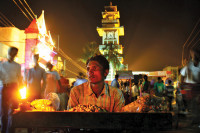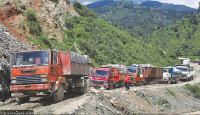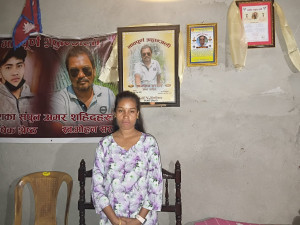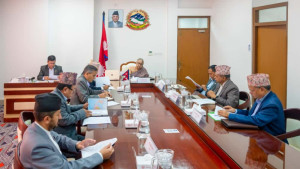Opinion
A war against graft
Corruption is often overlooked as a significant national security threat to a developing country
Daman Bahadur Ghale
Corruption can be broadly defined as the abuse of entrusted power for private gain. Corruption can range from a broad misuse of power and authority to moral decay. In simple terms, corruption is an act of bribery or the use of public power for private profit that constitutes a serious breach of the rule of law.
A national security threat
A broad and comprehensive concept of national security encompasses various security concerns, including human security. In contemporary defence doctrine, military security defends the nation from outside threats but human security defends the nation from internal threats as national stability depends on each individual having their security guaranteed. Human security covers a wide area, which includes the people’s right to a secure living environment and employment to preserve the quality of life. Human security is a holistic concept to be achieved by ensuring different security aspects related to individual security.
In this vein, corruption and poverty can be detrimental to human security and national development. Corruption in Nepal has become a chronic disease, posing grave threats to human security and resulting in the creation of inequalities, widening the gap between the rich and the poor. Corruption challenges the rule of law, transparency, accountability and good governance, and disturbs the basic fibre of social harmony by creating a trust deficit in society, posing serious threats to national security. Not only that, corruption provides a breeding ground for largely internal threats to national security, adding complex security challenges that most developing countries, including Nepal, are now facing. When corruption becomes endemic, it can derail political and economic transitions, undermine state capacity and legitimacy, exacerbate poverty and inflame grievances linked to many forms of conflicts.
The Nepali context
Governments across the world, particularly those in developing countries, have come to realise that threats to national security are more likely to emanate from internal rather than external sources; and Nepal is no exception. Corruption has been recognised as one of the chief causes of Nepal’s underdevelopment. This is really a great challenge to the campaign to build modern Nepal. Corruption has taken firm hold in Nepali society, causing significant negative impact to the socio-cultural value system at large.
Corruption is a complex and multifaceted phenomena with multiple causes and effects. It takes on various forms and functions in different contexts. After the restoration of democracy in Nepal, we have seen significant institutional development in the country’s political sphere. On the one hand, there is news of corruption everyday and on the other, corrupt people continue to enjoy political power, property and honour.
Synergising efforts
In many parts of the world, corruption has made a successful journey, mostly unchallenged, causing development to suffer, discouraging investment and increasing poverty. The most detestable factor is that corruption has caused politics to lose its ethos. Politics has now become a major industry or business for people in power. The wealth generated by power brings more power and subsequently, more wealth in a lucrative cycle. David Nussabaum, chief of Transparency International, has rightly remarked that corruption has a long history but research and analysis about its causes and effects has only increased in recent years. The major causes behind increasing corruption are a lack of political will to tackle corruption and poor implementation of anti-corruption laws and policies. Likewise, the politicisation of crime, the criminalisation of politics and poor institutional integrity also contribute to corruption.
The question now is how to curb corruption. There is no one-size-fits-all model for anti-corruption approaches, but a common starting point has been to establish an anti-corruption commission and formulate of laws and policies in this regard. But anti-corruption legislation alone cannot defeat this social evil without a unity of efforts from all factions of society, including efforts from both the government and non-governmental entities. To this end, the major impediments to curbing graft in Nepal are poor institutional integrity and policy deficiency in strengthening the national integrity system. When the anti-graft body, the court and the government collaborate on zero tolerance for corruption with a strong commitment to implementation, there is no reason why progress cannot be made in tackling corruption in just a few years.
Over the past decades, only Singapore and Hong Kong in this part of the world have demonstrated the political will to curb corruption. At a later phase, Indonesia has been able to replicate the same success story. As shown by Singapore, Hong Kong and Indonesia, curbing corruption in Nepal is not an impossible dream, but it does require the sustained commitment of political leaders and many stakeholders from different walks of life, including the vibrant civil society. The best approach to battling corruption is strong political will to implement anti-graft laws, regulations and procedures with a sustainable approach to synergise all possible efforts. There is a desperate need for a common alliance to battle corruption by fostering a culture of transparency, accountability and good governance.
To properly understand and fight corruption, its legal definition needs to be broadened. Transparency and accountability coupled with democratic principles of checks-and-balance are necessary instruments to do away with corruption and power abuse. Civil society too should not hesitate to boycott corrupt people culturally and socially in the pursuit of preserving ethical values in society. With good leaders and good policies, together with an effective working team at the policy formulation level, it is not impossible to curb corruption and provide the good governance necessary for the development of the country.
Ghale is a retired Major General of the Nepal Army




 16.12°C Kathmandu
16.12°C Kathmandu










